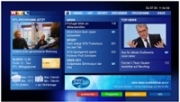UK split over hybrid TV

UK technology trade body Intellect has released a specification that will allow the European HbbTV hybrid TV standard to operate over the country’s digital terrestrial system.
This will put the UK in the rare position of having a dual hybrid TV system running over its terrestrial infrastructure, since the much-delayed YouView platform finally launched this month is based on different technology aligned with the International Standard Organization (ISO)’s MHEG-5 interactive TV specification.
MHEG-5 has been enhanced, partly with YouView in mind, by the UK DTG (Digital TV Group), resulting in the MHEG-5 Interaction Channel (MHEG-IC), which enables extended broadcast interactive services to be delivered over an IP connection.
The idea of MHEG-IC is to provide a seamless integration of linear broadcast channels with content delivered over IP, giving broadcasters full editorial control of the user experience. YouView, backed by all the UK’s leading broadcasters including the BBC and ITV, along with incumbent Telco BT, has been released with a hybrid set top box incorporating the bones of MHEG-IC, manufactured by Humax.
But, YouView has been criticized by Consumer Electronics (CE) companies for being out of step with the rest of Europe, which is running with the HbbTV hybrid standard originating in France and Germany, fragmenting the market as a result. This happened partly because HbbTV only really gathered momentum after YouView development had begun. Now these CE makers want to have HbbTV adopted alongside YouView so that they can sell the same HbbTV ready TVs and set tops across the whole of Europe, benefiting from scale economies.
This is why through their trade body Intellect the UK HbbTV specification has been released. Intellect, whose members include Astra, BT, Pace, Panasonic, Philips, Samsung and Sony, now wants to hold discussions with broadcasters, with plans to run a road show demonstrating how HbbTV is already being used in the rest of Europe.
Intellect, whose membership includes Astra, BT, Pace, Panasonic, Philips, Samsung and Sony, wants the UK to reflect the development of HbbTV in countries such as France, Italy and Germany.
“Moving towards TV without borders also gives huge scale advantages to UK content-makers and technology companies, in short the UK’s vital creative industries. Today is part of a discussion with UK stakeholders about how the UK can be a leading part of the European television market again,” said Intellect director William Higham. “There will soon be millions of devices in the UK’s homes that could activate their HbbTV capability, broadcasters across Europe such as the major French and German ones who could use it, and a huge reciprocal opportunity for the UK.”
The professional video industry's #1 source for news, trends and product and tech information. Sign up below.
